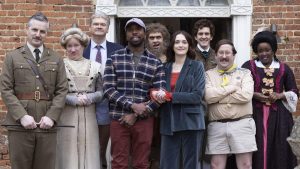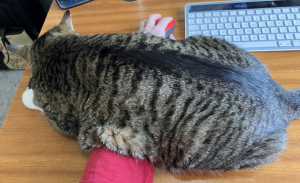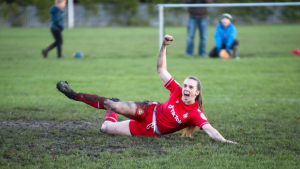Plus Black Women’s Non-Fiction Manuscript Prize, what it takes to become an agent, the light at the end of the frog, and an update on Grabbity’s eyes.
Hi there,
I’m back at my desk after a week off to recover from Ada Lovelace Day, and my brain’s not quite working yet. I could have done with another week or two, but time and tide wait for no one.
Suw’s news: So much writing to catch up on
Whilst Ada Lovelace Day might have been dominating my To Do list over the last few months, my brain was still throwing up ideas for new Word Count posts, so I’m going to have to have a little sit down very soon and just plan everything out. But I have lots of treats in store for you over the next few months, including the serialisations of my two novelettes, Argleton and Queen of the May.
Meantime, I have to finish the edits on E1 of Tag, and then novelise it ready to submit to the Discoveries writer development program, which has a deadline of 8 January 2024. I’m quite excited about this process – a large part of the reason that I’ve been working on all six episodes is that I think I stand a greater chance of this story seeing the light of day as a novel than as a TV series.
I also need to get back on track with Fieldwork, which means finish polishing up the transcripts for a couple of research interviews I did a while back and get the consent forms signed. I’ll print out all transcripts and annotate them, pulling out themes and ideas that I find funny or inspiring. Then it’ll be on to character development and writing some vignettes to try to get a handle on who these people are and how they behave.
Plus I need to write some more posts for the Fieldwork sub-newsletter – if you’re not signed up to that already, just head to your account settings and make sure you’ve elected to receive Fieldwork emails.
Read this: The Story Loom
I found this post from Simon K Jones about how he plans his stories, which he publishes serially on his newsletter, really fascinating. Writing a serial means that you need to have some level of planning, otherwise you can end up taking your readers down dead ends. But too much planning can take the fun out of writing, so Simon has landed on a halfway house that he calls the Story Loom which brings strands of story together at key turning points but still leaves enough flexibility to be spontaneous whilst writing.
Give it a read. Simon has diagrams and everything.
Stop, look, listen: The Lovecraft Investigations
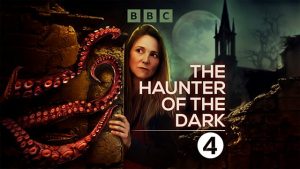 I spent most of my week off drafting a sewing pattern, a time-consuming process which requires some attention, but not too much. That meant that I had a lot of time to listen to The Lovecraft Investigations on BBC Sounds, an HP Lovecraft-inspired audio drama from Julian Simpson that’s part of his Pleasant Green universe (much of which you can hear here).
I spent most of my week off drafting a sewing pattern, a time-consuming process which requires some attention, but not too much. That meant that I had a lot of time to listen to The Lovecraft Investigations on BBC Sounds, an HP Lovecraft-inspired audio drama from Julian Simpson that’s part of his Pleasant Green universe (much of which you can hear here).
I have to admit that I’ve not previously been all that into audio dramas. Podcasts, yes. I’ll listen to those til my ears fall off. Maybe that’s why I like The Lovecraft Investigations so much – they’re written as if they were a true crime podcast, although they are far better produced than most podcasts. The writing is fantastic, as are the performances, but what elevates this series is the sound design. It’s immersive without being overwhelming and it helps to really guide your understanding of what’s going on in a scene, rather than getting in the way.
It’s worth comparing to The Dark Is Rising from last winter, which I found underwhelming. I said at the time:
[U]ltimately, I was a bit disappointed. The adaptation felt a bit overwrought at times and the soundscape could be overwhelming.
[…] The problem with the adaptation was that, in order to stop it being dominated by narration, they had to put some of the action descriptions into the main character’s internal monologue. The result is lots of slightly odd interjections and a halting nature to some of the dialogue. And when you compare this functional dialogue, if you will, to the speech Susan Cooper actually wrote, it stands out a mile.
I have to admit, The Lovecraft Investigations had made me want to learn about writing for radio now.
Opportunity: Black Women’s Non-Fiction Manuscript Prize
Cassava Republic Press has just announced its Black Women’s Non-Fiction Manuscript Prize, with a prize of $20,000 and a publishing contract with Cassava Republic Press up for grabs. The prize is open to “Black women writers who bridge the gap between ‘creativity’ and ‘theory’ with [non-fiction] work that is both rigorous and beautiful, creative and thoughtful.”
To apply, submit sample chapters and a pitch letter, by 23:59 GMT on 31 March 2024.
Read this, two: What does it take to become an agent?
As authors, we all want an agent, but what does the life of an agent look like? Leigh Stein asked herself whether she wanted to pivot her career to become a literary agent and, in doing so, gave the rest of us a really important glimpse into agents’ lives.
Bear in mind whilst reading all the reports of writers’ advances going down, because as writers earn less so do agents.
Tip-top tip: Light at the end of the frog
Congratulations to this year’s Hugo Award winner: Ursula Vernon, writing as T Kingfisher, for Nettle & Bone.
Unable to attend in person, Vernon’s speech was read by Arley Song at the Chengdu Worldcon in China, but to be honest, it needs to be read by everyone. It’s not long, and you should click through right now and learn something about beetles and frogs that you will never forget.
Obligatory cat picture
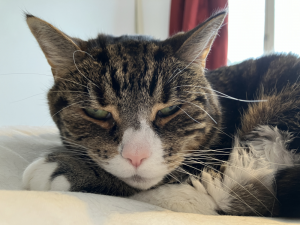 Grabbity and I went back to the vet for another check-up last week, but the news wasn’t great. The corneal ulcer on her left eye has come back, possibly because the Maxitrol eyedrops we were using had become unavailable so there was a three week gap in her treatment. We’re now on some other drops which she absolutely hates.
Grabbity and I went back to the vet for another check-up last week, but the news wasn’t great. The corneal ulcer on her left eye has come back, possibly because the Maxitrol eyedrops we were using had become unavailable so there was a three week gap in her treatment. We’re now on some other drops which she absolutely hates.
This doesn’t seem to be a condition that’s going to clear up quickly, and at the moment it’s looking like we’ll be spending £30 a month on eyedrops for the foreseeable future. Thank goodness for pet insurance. I have to say, ManyPets have been amazing, sometimes paying out the same day. (If you need pet insurance, then use my referral link and we’ll both get a gift card.)
Thankfully, Grabbity seems fine in herself. If she’s in pain, she’s hiding it well – she doesn’t fuss with her eyes, they aren’t weeping, and they don’t seem to be causing her any problems. But they do look like the surface of the moon, and I can’t imagine that they can be such a mess and not at least uncomfortable. But she’s stoic, and we will continue treatment for as long as needed.
That’s it for this week. Now that ALD is over, I might go back to shorter emails on a weekly schedule. Let me know what you’d prefer via the poll on Substack!
All the best,
Suw
{ Comments on this entry are closed }

